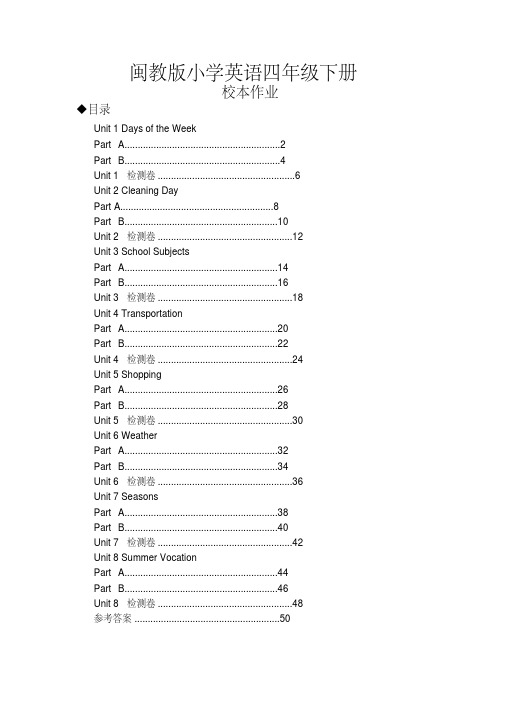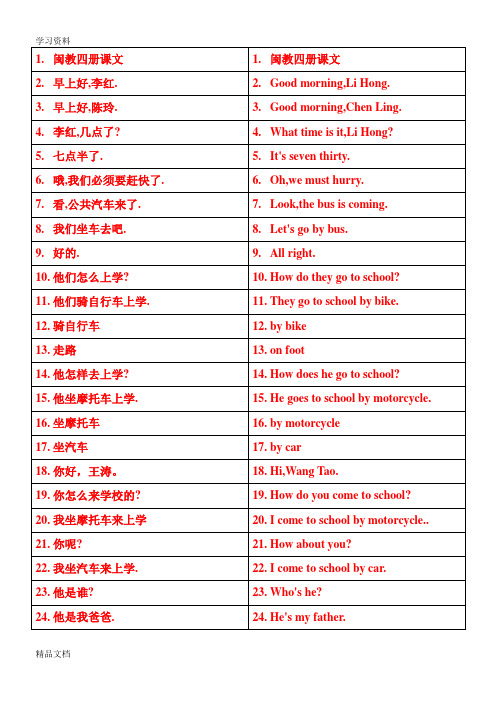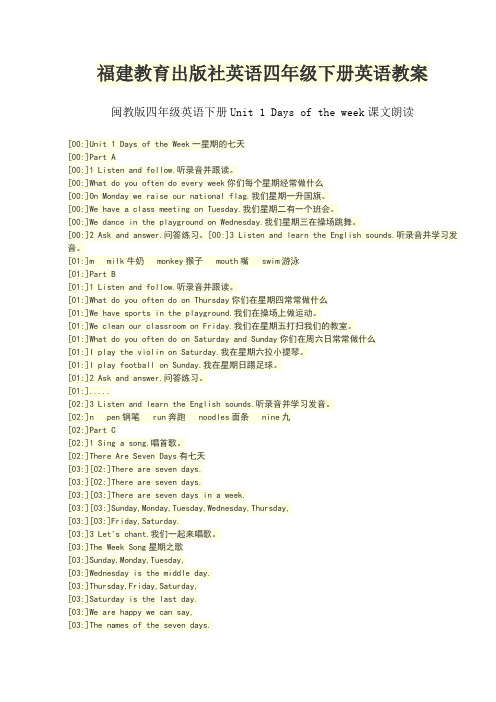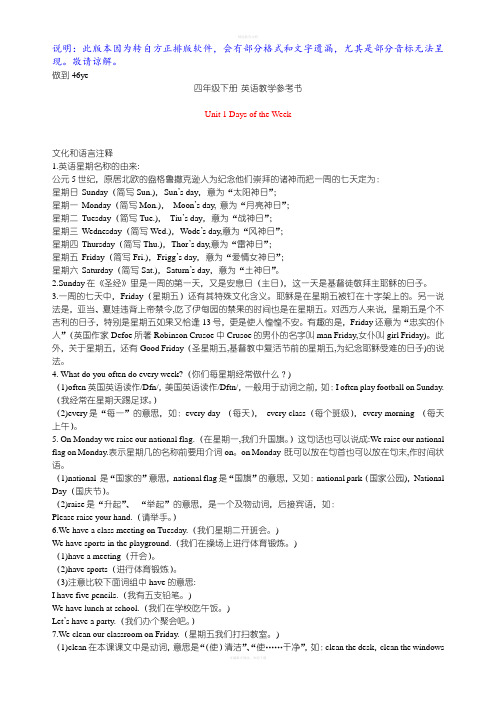闽教版英语教学参考书(四年级下册)(1)
(完整版)闽教版小学英语四年级下册校本作业

C where
( ) 4. A dance B drawing C swim
三、课时提升
VI . 选出与图意相符的词组并抄在四线格上。
1. What do you often do on Monday
?
I often
★ play basketball
★ play football
2. What do you often do on Tuesday? I often
Unit1 Days of the week
Part B
完成时间 : 30 分钟以内
编者:肖伟青
一、基础训练
学校 _
I. 正确抄写下列单词或句子。
often
bright
clean
班级 _ week
学生
审核:许顺英
on Friday
clean the blackboard
I play the violin on Sunday.
B.I often play basketball in the playground.
(
) 3. A. What do you often do on Thursday, Julia?
B. I often read in the library.
(
) 4. A. What do you often do on Sunday, Lily?
(
) 4). A. tea B. clean C. bread
(
) 5). A. Tuesday B. bus C. Sunday
三、课时提升
V. 将下列单词按要求esday play
clean library
classroom Sunday raise Friday
最新闽教版小学英语第四册(四级下册用)课文英汉互译讲解学习

46.On Monday I go to work on foot
47.星期二我骑车去上班
47.On Tuesday I go to work by bike.
48.星期三我骑摩托车去上班.
48.On Wednesday I go to work by motorcycle.
23.他是谁?
23.Who's he?
24.他是我爸爸.
24.He's my father.
25.他在上海工作吗?
25.Does he work in Shanghai?
26.不.但是他经常坐飞机去上海.
26.No.But he often goes to Shanghai by plane.
27.她是谁?
27.Who's she?
28.她是我阿姨.
28.She's my aunt.
29.她是一个正在北京上ቤተ መጻሕፍቲ ባይዱ的学生.
29.She's a student in Beijing.
30.她怎么去北京?
30.How does she go to Beijing?
31.坐火车.
31.By train.
32.他们怎么去北京?
65.过来吃午饭,孩子们
65.ch Come and have lunch,children
66.太好了,桃子!
66.Great,peaches!
67.现在七点五十了,妈妈.
67.It's seven fifty,Mom.
68.过来看电视.
e and watch TV.
69.我来了.
69.I'm coming.
福建教育出版社四年级下册英语课文译文

福建教育出版社英语四年级下册英语教案闽教版四年级英语下册Unit 1 Days of the week课文朗读[00:]Unit 1 Days of the Week一星期的七天[00:]Part A[00:]1 Listen and follow.听录音并跟读。
[00:]What do you often do every week你们每个星期经常做什么[00:]On Monday we raise our national flag.我们星期一升国旗。
[00:]We have a class meeting on Tuesday.我们星期二有一个班会。
[00:]We dance in the playground on Wednesday.我们星期三在操场跳舞。
[00:]2 Ask and answer.问答练习。
[00:]3 Listen and learn the English sounds.听录音并学习发音。
[01:]m milk牛奶 monkey猴子 mouth嘴 swim游泳[01:]Part B[01:]1 Listen and follow.听录音并跟读。
[01:]What do you often do on Thursday你们在星期四常常做什么[01:]We have sports in the playground.我们在操场上做运动。
[01:]We clean our classroom on Friday.我们在星期五打扫我们的教室。
[01:]What do you often do on Saturday and Sunday你们在周六日常常做什么[01:]I play the violin on Saturday.我在星期六拉小提琴。
[01:]I play football on Sunday.我在星期日踢足球。
[01:]2 Ask and answer.问答练习。
新版闽教版四年级下册 英语教学参考书

说明:此版本因为转自方正排版软件,会有部分格式和文字遗漏,尤其是部分音标无法呈现。
敬请谅解。
做到46ye四年级下册英语教学参考书Unit 1 Days of the Week文化和语言注释1.英语星期名称的由来:公元5世纪,原居北欧的盎格鲁撒克逊人为纪念他们崇拜的诸神而把一周的七天定为:星期日Sunday(简写Sun.),Sun’s day,意为“太阳神日”;星期一Monday(简写Mon.),Moon’s day, 意为“月亮神日”;星期二Tuesday(简写Tue.),Tiu’s day,意为“战神日”;星期三Wednesday(简写Wed.),Wode’s day,意为“风神日”;星期四Thursday(简写Thu.),Thor’s day,意为“雷神日”;星期五Friday(简写Fri.),Frigg’s day,意为“爱情女神日”;星期六Saturday(简写Sat.),Saturn’s day,意为“土神日”。
2.Sunday在《圣经》里是一周的第一天,又是安息日(主日),这一天是基督徒敬拜主耶稣的日子。
3.一周的七天中,Friday(星期五)还有其特殊文化含义。
耶稣是在星期五被钉在十字架上的。
另一说法是,亚当、夏娃违背上帝禁令,吃了伊甸园的禁果的时间也是在星期五。
对西方人来说,星期五是个不吉利的日子,特别是星期五如果又恰逢13号,更是使人惶惶不安。
有趣的是,Friday还意为“忠实的仆人”(英国作家Defoe所著Robinson Crusoe中Crusoe的男仆的名字叫man Friday,女仆叫girl Friday)。
此外,关于星期五,还有Good Friday(圣星期五,基督教中复活节前的星期五,为纪念耶稣受难的日子)的说法。
4. What do you often do every week?(你们每星期经常做什么?)(1)often英国英语读作/Dfn/,美国英语读作/Dftn/,一般用于动词之前,如:I often play football on Sunday.(我经常在星期天踢足球。
闽教版四年级下册英语说课稿范文

闽教版四年级下册英语说课稿范文全文共6篇示例,供读者参考篇1Hello everyone, today I'm going to talk about the textbooks in the Minnan Teaching Edition Grade 4 English class. The textbooks in this class are very fun and interesting.In this class, we will learn about different topics like animals, food, family, and activities. We will also learn how to greet people, talk about our hobbies, and describe things. The textbooks are filled with colorful pictures and fun activities that will help us learn English in a fun way.One of my favorite parts of the textbook is when we learn about animals. We get to learn the names of different animals like dogs, cats, birds, and rabbits. We also learn how to describe animals using adjectives like big, small, fast, and slow. It's so much fun to learn about animals and their characteristics.Another fun part of the textbook is when we learn about food. We get to learn the names of different foods like pizza, hamburgers, fruits, and vegetables. We also learn how to expressour likes and dislikes for food. It's so interesting to talk about food and share our favorite dishes with each other.Overall, the textbooks in the Minnan Teaching Edition Grade 4 English class are very engaging and interactive. We get to learn English in a creative and fun way. I'm really looking forward to learning more and improving my English skills in this class. Thank you for listening to my speech!篇2Hello everyone, I'm going to talk about our English textbook for the fourth grade in Fujian province. There are so many fun and interesting things to learn in this book!First, we learn about daily routines. We talk about what we do in the morning, afternoon, and evening. We also learn how to ask and answer questions about daily activities. For example, "What do you do in the morning?"Next, we learn about food and drinks. We talk about our favorite foods and drinks, and learn how to order food in a restaurant. It's fun to practice saying "I would like a hamburger and a cola, please."Then, we learn about animals. We can learn about different animals like cats, dogs, birds, and fish. We learn how to describe animals using words like big, small, fast, and slow. It's so exciting to learn about all the different animals in the world!Finally, we learn about the weather. We talk about different kinds of weather like sunny, rainy, cloudy, and snowy. We also learn how to talk about the seasons and what activities we can do in each season. It's great to be able to talk about the weather with our friends!In conclusion, this textbook is full of fun and interesting things to learn. We can practice speaking English with our classmates and teachers, and improve our English skills together. Let's have a great time learning English and enjoy every moment of it! Thank you for listening.篇3Hi everyone, my name is Lucy and I'm in fourth grade. Today, I'm going to talk about the English textbook for the fourth grade of Fujian Edition. This textbook has a lot of fun and interesting things to learn.First, let's talk about Unit 1. In Unit 1, we learn about daily routines. We learn how to say what time we do things like wakeup, have breakfast, go to school, and go to bed. We also learn about different meals like breakfast, lunch, and dinner. It's really cool to talk about our daily routines and meals in English.Next, let's talk about Unit 2. In Unit 2, we learn about different places in our community. We learn how to say the names of places like the library, the park, the post office, and the supermarket. We also learn how to ask for directions and give directions to different places. It's so much fun to talk about places in our community in English.Finally, let's talk about Unit 3. In Unit 3, we learn about different animals and their habitats. We learn how to say the names of animals like lions, tigers, elephants, and monkeys. We also learn about different habitats like the zoo, the forest, the ocean, and the jungle. It's really interesting to talk about animals and their habitats in English.In conclusion, the English textbook for the fourth grade of Fujian Edition is really fun and interesting. We learn about daily routines, places in our community, and animals and their habitats. I hope you all enjoy learning English as much as I do. Thank you for listening!篇4Hello everyone, my name is Lily and today I'm going to tell you about the English lesson we are going to learn in the Ming teaching version Grade 4 Lower Book.In this lesson, we will learn about different animals and their habitats. We will learn how to say the names of the animals in English and also learn some simple sentences to describe where they live.First, we will learn about animals that live in the jungle, like tigers, monkeys, and snakes. We will learn how to say their names and how to describe the jungle as a habitat.Next, we will learn about animals that live in the ocean, like dolphins, sharks, and octopuses. We will learn how to say their names and how to describe the ocean as a habitat.After that, we will learn about animals that live in the desert, like camels, scorpions, and cacti. We will learn how to say their names and how to describe the desert as a habitat.Finally, we will learn about animals that live in the arctic, like polar bears, penguins, and seals. We will learn how to say their names and how to describe the arctic as a habitat.I hope you are all excited to learn about these animals and their habitats. Let's have a fun and exciting lesson together! Thank you for listening.篇5Hello everyone, today I'm going to talk about the English textbook for the fourth grade in Fujian Province. This book is super fun and interesting, and I can't wait to share it with you all!First of all, in this textbook, we will learn a lot of new words and phrases. For example, we will learn how to introduce ourselves, talk about our hobbies, and describe our family members. These are all important things to know when we are learning English.Next, we will also learn how to ask and answer questions in English. This will help us communicate with others and make new friends. We will practice speaking and listening, so we can become more confident in our English skills.Furthermore, in this textbook, we will learn about different cultures and traditions from around the world. This will help us have a better understanding of the world and the people in it. We will also learn about different holidays and celebrations, which will be so much fun!Lastly, we will have lots of activities and games to help us learn English in a fun way. We will sing songs, do role plays, and even watch videos to practice our listening skills. I'm sure we will all have a great time learning English together!In conclusion, this textbook is full of exciting and engaging lessons that will help us improve our English skills. I can't wait to start learning with all of you. Let's have a fantastic time learning English together in the fourth grade! Thank you!篇6Hello everyone, I'm a fourth grader in Min teaching edition. Today I'm going to talk about a lesson in our English textbook.First, I will introduce the title of the lesson, which is "My School Day". This lesson is all about talking about your daily routine at school, like what time you get up, what you do in the morning, what subjects you have, and what you do in the afternoon.Next, I will talk about the objectives of this lesson. By the end of this lesson, we should be able to talk about our school day using simple sentences. We will also learn new words and phrases related to daily routines.Now, let's move on to the lesson plan. We will start by listening to a dialogue between two students about their school day. Then, we will do some vocabulary exercises to learn new words. After that, we will practice speaking by talking about our own school day in pairs or groups.To make the lesson more interactive and fun, we will play some games related to daily routines. We will also do some role-plays to practice our speaking skills.In conclusion, this lesson is all about talking about our school day in English. I hope you all enjoy learning and practicing English with me today. Thank you for listening!。
闽教版四年级下册英语说课稿范文

探索闽教版四年级下册英语说课稿的奥秘 **Exploring the Mystery of the Fujian Education Edition's Fourth-Grade English Lesson Plan for the Second Semester**In the realm of education, lesson plans serve as the roadmap for effective teaching and learning. This article delves into the secrets of the Fujian Education Edition's fourth-grade English lesson plan for the second semester, analyzing its structure, content, and teaching methods to reveal its unique pedagogical value.**一、引言****Introduction**The Fujian Education Edition's fourth-grade English lesson plan for the second semester is a comprehensive guide designed to facilitate the teaching and learning of English among fourth-grade students. This lesson plan is tailored to meet the educational needs and learning abilities of students in this grade level, ensuring that they are equipped with the necessary language skills and knowledge.**二、课程结构分析****Analysis of the Course Structure**The lesson plan is structured in a way that promotes sequential learning and gradual mastery of language concepts. It begins with a review of previously learned material, followed by the introduction of new vocabulary and grammar concepts. This gradual approach ensures that students build a solid foundation of knowledge upon which they can further develop their language skills.**三、教学内容解读****Interpretation of Teaching Content**The focus of the lesson plan is on developing students' reading, writing, speaking, and listening skills through various activities and exercises. The selection of texts and materials is carefully crafted to engage students' interest and challenge their cognitive abilities. The integration of real-world scenarios and contextualized learning makes the content more relevant and meaningful for students.**四、教学方法探讨****Exploration of Teaching Methods**The lesson plan employs a variety of teaching methods such as whole-class teaching, group discussion, pair work, and individual practice. These methods aim to create an inclusive learning environment where students can collaborate, communicate, and develop their language skills effectively. The use of interactive activities and games adds fun to the learning process, motivating students to actively participate and engage with the material.**五、评估与反馈****Assessment and Feedback**The lesson plan includes regular assessments and feedback sessions to monitor students' progress andidentify areas where further improvement is needed. This continuous evaluation ensures that students are provided with timely and targeted guidance to address their weaknesses and strengths. The feedback sessions also provide an opportunity for students to reflect on their learning and identify areas for self-improvement.**六、结论****Conclusion**The Fujian Education Edition's fourth-grade English lesson plan for the second semester is a comprehensive and well-structured guide that promotes effective teaching and learning. Its focus on sequential learning, contextualized content, and diverse teaching methods ensures that students develop a solid foundation of English language skills. The regular assessments and feedback sessions further enhance the learning experience by providing timely guidance and support to students. By embracing this lesson plan, teachers and students alike can embark on a journey of discovery and growth in the world of English language education.**探索闽教版四年级下册英语说课稿的奥秘**在教育的领域中,说课稿是有效教学和学习的路线图。
福建教育出版社(闽教版)四年级下册小学英语全册课件PPT

星期二我们开班会。
We have a class meeting _o_n_ Tuesday.
星期三我们在操场上跳舞。 We dance in the playground _o_n_ Wednesday.
星期___你经常做什么
What do you often do on______ ?
We….
art 美术
I like art. But I’m not good at it. 我喜欢美术。但是我不擅长它。
Bus
Don’t worry. 不要担心。
I can help you. 我会帮助你。
Don’t worry. 不要担心。
I can help you. 我会帮助你。
Don’t worry. 不要担心。
clean the window Sally is cleaning the window.
clean the desk Lily is cleaning the desks.
clean the chair Yang Ming is cleaning the chair.
clean the door Wang Tao is cleaning the door.
math 数学 mouth 嘴巴
PE 体育
computer 电脑
music 音乐
arm 手臂
art 美术
music Subjectsmath
Chinese math English
CchoinmepsuetermusicEnglish computer art English
P.E. art math
A: English B: Math
Free talk
四年级英语下册 Unit3 PartA闽教版(1)

Unit 3 School Subjects文化和语言注释1.What day is today?(今天礼拜几?)It’s Wednesday.(礼拜三。
)What day is today?中的day指的是礼拜几,不指日期。
询问几月几号用的句子是:What’s the date today?(今天是几月几号?)2.We have a math class this morning.(咱们今天上午有一节数学课。
)(1)math(数学)是美国英语,maths是英国英语,都是学科的名称mathematics(数学)的缩写形式,是不可数名词。
(2)“今天上午”英语是:this morning,不能用today morning。
“在上午”英语是:in the morning,可是在this morning之前不能加in。
(3)类似的表达法还有:this afternoon(今天下午),this evening(今天晚上)。
可是不讲this night,而用tonight(今天晚上)。
3.We have an English class,too.(咱们上午也有一节英语课。
)I like it.But I’m not good at it.(我喜爱英语,可是我英语学得不行。
)(1)English能够说明为“英语”、“英国人”、“英国的”,如:Do you like English?(你喜爱英语吗?)Are they English?(他们是英国人吗?)English history is very interesting.(英国历史超级有趣。
)(2)be good at...(擅长……)后接名词、代词或动名词,如:He is good at math,but I’m not good at it.(他数学学得专门好,但我学得不行。
)Wang T ao is good at running.(王涛擅长跑步。
)4.Don’t worry.(别担忧。
- 1、下载文档前请自行甄别文档内容的完整性,平台不提供额外的编辑、内容补充、找答案等附加服务。
- 2、"仅部分预览"的文档,不可在线预览部分如存在完整性等问题,可反馈申请退款(可完整预览的文档不适用该条件!)。
- 3、如文档侵犯您的权益,请联系客服反馈,我们会尽快为您处理(人工客服工作时间:9:00-18:30)。
闽教版四年级下册英语教案Unit 1 Days of the Week文化和语言注释1.英语星期名称的由来:公元5世纪,原居北欧的盎格鲁撒克逊人为纪念他们崇拜的诸神而把一周的七天定为:星期日 Sunday(简写Sun.),Sun’s day,意为“太阳神日”;星期一 Monday(简写Mon.), Moon’s day, 意为“月亮神日”;星期二 Tuesday(简写Tue.), Tiu’s day,意为“战神日”;星期三 Wednesday(简写Wed.),Wode’s day,意为“风神日”;星期四 Thursday(简写Thu.),Thor’s day,意为“雷神日”;星期五 Friday(简写Fri.),Frigg’s day,意为“爱情女神日”;星期六 Saturday(简写Sat.),Saturn’s day,意为“土神日”。
2.Sunday在《圣经》里是一周的第一天,又是安息日(主日),这一天是基督徒敬拜主耶稣的日子。
3.一周的七天中,Friday(星期五)还有其特殊文化含义。
耶稣是在星期五被钉在十字架上的。
另一说法是,亚当、夏娃违背上帝禁令,吃了伊甸园的禁果的时间也是在星期五。
对西方人来说,星期五是个不吉利的日子,特别是星期五如果又恰逢13号,更是使人惶惶不安。
有趣的是,Friday还意为“忠实的仆人”(英国作家Defoe 所著Robinson Crusoe中Crusoe的男仆的名字叫man Friday,女仆叫girl Friday)。
此外,关于星期五,还有Good Friday(圣星期五,基督教中复活节前的星期五,为纪念耶稣受难的日子)的说法。
4. What do you often do every week?(你们每星期经常做什么?)(1)often英国英语读作/Dfn/,美国英语读作/Dftn/,一般用于动词之前,如:I often play football on Sunday.(我经常在星期天踢足球。
)(2)every是“每一”的意思,如:every day (每天), every class(每个班级),every morning (每天上午)。
5. On Monday we raise our national flag.(在星期一,我们升国旗。
)这句话也可以说成:We raise our national flag on Monday.表示星期几的名称前要用介词on。
on Monday 既可以放在句首也可以放在句末,作时间状语。
(1)national 是“国家的”意思,national flag是“国旗”的意思,又如:national park(国家公园),National Day(国庆节)。
(2)raise是“升起”、“举起”的意思,是一个及物动词,后接宾语,如:Please raise your hand.(请举手。
)6.We have a class meeting on Tuesday.(我们星期二开班会。
)We have sports in the playground.(我们在操场上进行体育锻炼。
)(1)have a meeting(开会)。
(2)have sports(进行体育锻炼)。
(3)注意比较下面词组中have的意思:I have five pencils.(我有五支铅笔。
)We have lunch at school.(我们在学校吃午饭。
)Let’s have a party.(我们办个聚会吧。
)7.We clean our classroom on Friday.(星期五我们打扫教室。
)(1)clean在本课课文中是动词,意思是“(使)清洁”、“使……干净”,如:clean the desk,clean the windows 等。
(2)clean也可以作形容词,意思是“清洁的”、“整齐的”,如:Our classroom is clean and bright.(我们的教室干净、明亮。
)8. I play the violin on Saturday.(星期六我拉小提琴。
)I play football on Sunday.(星期天我踢足球。
)注意play 在上述两个句子中的中文含义及其后所接的名词是否带冠词。
(1)在乐器之前要加上定冠词the,如:play the piano(弹钢琴),play the guitar(弹吉他)。
(2)在体育运动名称前不用冠词,如:play basketball (打篮球),play ping-pong(打乒乓球)。
9.辅音字母m 读作/m/,注意,这是一个鼻辅音,发音时双唇要闭拢。
10.辅音字母n 经常读作/n/,注意,这也是个鼻辅音。
Part A教学内容:Unit1 Birthday Part A教学目标:(一)语言知识目标1.学习单词:often,Monday,Tuesday,Wednesday,flag,meeting和短语every week,raise our national flag,have a class meeting。
2.学习句子:What do you often do every week?We....3.学习字母m在单词中的发音。
4.欣赏歌曲:There Are Seven Days.5.功能:介绍日常活动内容。
(二)语言技能目标1.能够认读和正确书写单词 Monday,Tuesday,Wednesday和初步运用often,raise our national flag,havea class meeting,every week等。
2.能够用句型What do you often do every week? We....表达一周中每天的活动。
(三)情感态度珍惜时间,养成良好生活习惯。
教学重难点:1.能够认读和正确书写单词 Monday,Tuesday,Wednesday和初步运用often,raise our national flag,havea class meeting,every week等。
2.能够用句型What do you often do every week? We....表达一周中每天的活动教法:多媒体教学法学法:合作学习教具准备1.本课所需的单词和词组卡片。
2.部分活动内容的图片,如“升旗”、“开班会”、“跳舞”等。
3.一本挂历,一面国旗。
4.录音机或教学光盘。
教学过程Step 1Warming up1.师生互致问候。
2.师生自由对话,如:T: Good morning.Nice to see you!How are you?What do you do on holiday?Step 2 Review1.复习有关动作的单词和词组。
(1)教师说单词或词组,学生做动作,如:教师说“sing”,学生做唱歌的动作。
教师说“dance”,学生做跳舞的动作。
……以此类推,复习draw,fly a kite,play the violin,play football等。
(2)出示这些单词和词组卡片,全体学生快速并大声地朗读。
(3)请个别学生带读,其余学生做动作。
2.欣赏歌曲:There Are Seven Days.教师播放歌曲录音二至三遍,学生边听边模仿,教师边唱边指着黑板上挂历的每一天,帮助学生理解歌词大意。
3.导入并揭示课题。
(1)教师说:“This song is about... .”请学生说一说,可以用中文说。
(2)由歌曲导入课题,揭示课题并板书Unit 2 Days of the Week Part A(3)由课题引出单词week和every week的教学。
Step 3 Presentation(一)教授单词often及句子What do you often do every week?1.教师边问边在黑板上出示句子:What do you often do every week?2.教师出示单词卡片often,帮助学生了解该单词含义,然后进行教学。
3.教师将该句子按意群分为两个部分——What do you often do和every week,教师先示范,再领读,然后请个别学生读。
4.请学生用英语说一说每周都做了什么事情。
(二)教授单词Monday,Tuesday,Wednesday和词组on Monday,on Tuesday,on Wednesday1.教师说:“What do Lily and her classmates often do every week?Please watch the video.”2.教师播放课文录音或教学光盘,同时出示下列:on Monday,on Tuesday,on Wednesday词组卡片和“升旗”、“开班会”、“跳舞”图片,随着录音的内容,将卡片和图片随机贴在黑板上。
3.请学生翻开课本第2页,自读课文,然后请个别学生上台,将黑板上的卡片按课文内容排列如下:on Mondayon Tuesdayon Wednesday4.教学Monday和on Monday。
(1)教师出示Monday的单词卡片,教学该单词的音和形。
(2)教师板书单词Monday,在书写时,用红色粉笔书写字母M,告诉学生,表示星期的单词的首字母必须大写。
(3)教师请学生说一说,还有什么时候,单词的首字母必须大写。
(4)教师出示挂历,请学生看挂历上英文星期一的缩写表达法:Mon.,让学生知道Monday可以缩写为“Mon.”。
(5)教师指着黑板上on Monday的卡片,引导学生朗读并记忆。
5.采用同样的方法教学Tuesday,on Tuesday,Wednesday和on Wednesday。
(三)教授句子On Monday we raise our national flag.We have a class meeting on Tuesday.We dance in the playground on Wednesday.1.教师说:“What do Lily and her classmates often do on Monday?Please listen carefully.”2.教师播放课文第一幅图的录音数遍,然后出示一面国旗,对学生说:“This is our national flag.”教学flag,national和our national flag。
3.教师做升旗的动作,教学raise our national flag和On Monday we... .4.教师采用同样的方法教学另外两个句子,告诉学生On Monday既可以放在句首,也可以放在句子的末尾。
